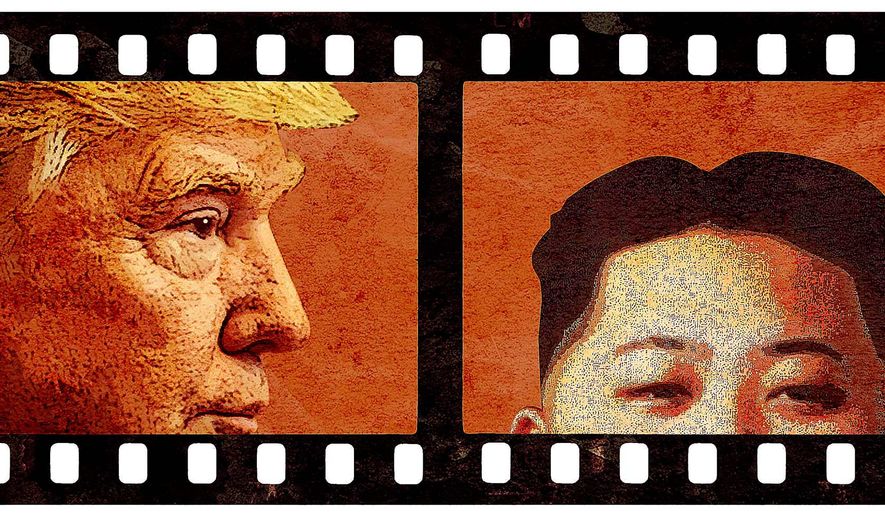OPINION:
Before he meets with Kim Jong-un, President Trump should watch the movie “WarGames,” which marks the 35th anniversary of its release next month. Why “WarGames?” Of the hundreds of movies I watched with Ronald Reagan, it is the only one I ever knew to have impacted his thinking during his years in the White House. What stayed with Ronald Reagan after he saw that movie 35 years ago in his cabin at Camp David remains a concern today and is something Mr. Trump and Mr. Kim should discuss.
The film’s storyline was fanciful. A U.S. Air Force computer in charge of America’s nuclear arsenal goes haywire and is on the verge of launching a pre-emptive missile strike against the Soviet Union, only to be averted at the last minute through the resourcefulness of a teen computer whiz played by Matthew Broderick.
For the most part, Mr. Reagan enjoyed and appreciated the hundreds of movies he and Nancy saw together during weekends at Camp David, but “WarGames” weighed on his mind long after the lights came up in Aspen Lodge, their residence there. To Mr. Reagan, nuclear war was no game and he worried about the possibility of an accidental launch by either side. That’s why he so adamantly supported the Strategic Defense Initiative (SDI). He viewed it as the last chance to spare the world the horrors of nuclear war, especially if missiles were launched by accident as depicted in “WarGames.”
For the Reagans, watching movies on weekends was a way to relax, briefly escape the pressures of life in the White House, maybe have a laugh, and keep in touch with their former profession. They wanted nothing other than to be entertained. The sobering message of “WarGames” denied Mr. Reagan that simple pleasure. That’s not to say the movie changed his thinking and made him anti-nuke. Rather, it reinforced it.
Ronald Reagan was always concerned about the danger nuclear weapons posed to the world. He spoke often of his opposition to the mutually assured destruction (MAD) policies we and the Soviets had come to accept, and envisioned a world free from the threat of such annihilation.
From the first days of his presidency, Mr. Reagan worked to develop a relationship with his Soviet counterpart so he could begin the process of reducing nuclear arsenals, but as he put it, “they kept dying” on him. When “WarGames” was screened at Camp David in June 1983, Yuri Andropov was in charge in Moscow, having recently succeeded Leonid Brezhnev, who had died the previous year. Mr. Andropov died in 1984, and was replaced by Konstantin Chernenko, who died after just 13 months in office.
It was not until 1985 that Mikhail Gorbachev assumed power, and there was finally someone in place with whom Mr. Reagan could work to reach agreements on reducing nuclear weapons. Mr. Reagan knew that as long as such weapons existed, there was the chance of a catastrophic accident. To him it was essential that everything possible be done to avoid that.
That’s why Mr. Reagan ended his summit with Mikhail Gorbachev in Reykjavik in 1986. The Reykjavik meeting was held because there were strong indications the Soviets might be willing to eliminate all ballistic missiles. Mr. Reagan and Mr. Gorbachev discussed that in earnest at Hofdi House, until a last-minute ambush, when the Soviets insisted the U.S. abandon our Strategic Defense Initiative as the price for such an agreement — something they knew Mr. Reagan would never accept. He wisely decided to walk away. Perhaps “WarGames” was in the back of his mind.
When they meet, Mr. Trump and Mr. Kim will serve the American, Korean and all peoples of the world well if they can agree to a procedure by which the possibility of an accidental nuclear war is eliminated or at least significantly reduced. Resolving the problem on which “WarGames” was based would be an important accomplishment of a Trump-Kim summit. It may not be the “complete denuclearization” we seek, but it would be an important first step and would make the world safer. Some might even consider it worthy of the Nobel Peace Prize.
Maybe Mr. Trump could take a print of the movie to the summit and watch it with Mr. Kim over a bowl of popcorn. Wouldn’t that be something?
• Mark D. Weinberg, author of “Movie Nights with the Reagans” (Simon & Schuster), served as special assistant to the president and director of public affairs in the Reagan White House. He is currently a communications consultant.




Please read our comment policy before commenting.